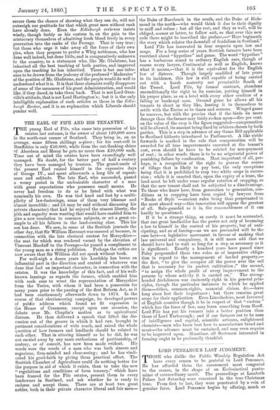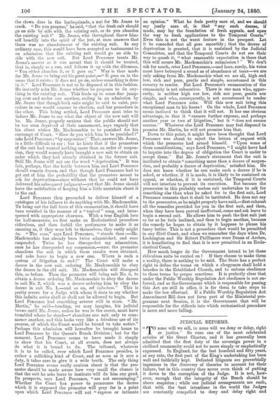LORD PENZANCE'S LAST JUDGMENT. T HOSE who dislike the Public Worship
Regulation Act have every reason to be grateful to Lord Penzance. He has afforded them the amusement most congenial to the season, in the shape of an Ecclesiastical panto- mime of extraordinary merit. The proceedings at Lambeth Palace last Saturday were conceived in the true Christmas tone. From first to last, they were penetrated by a vein of genuine farce. Lord Penzance begins by offering, much as the clown does in the harlequinade, a nut for Mr. Jenne to crack. " Do you propose," he said, "that the fresh suit should go on side by side with the existing suit, or do you abandon the existing suit ?" Mr. Jenne, who throughout threw him- self heartily into the spirit of the jest, at once answers that there was no abandonment of the existing suit. In any ordinary case, this would have been accepted as tantamount to an admission that the existing suit would go on side by side with the new suit. But Lord Penzance treats Mr. Jeune's answer as it was meant that it should be treated, that is, simply as a cue, and follows it up with the dilemma, " You either abandon it, or it goes on." Way is thus made for Mr. Jeune to bring out his great point,—" It goes on in the sense that it exists ; it does not go on, unless something is done in it." Lord Penzance is not to be disposed of in this fashion. He instantly asks Mr. Jenne whether he proposes to do any- thing in the existing suit. This leads up to some fine jump- ing over and under one another, ending in an admission by Mr. Jenne that though both suits might be said to exist, pro- cedure in one would amount to election, and bar procedure in the other. This being settled, Lord Penzance next tries to induce Mr. Jenne to say what the object of the new suit will be. Mr. Jeune, properly anxious that the public should not be too soon deprived of their amusement, says vaguely that his client wishes Mr. Mackonochie to be punished for his contempt of Court. "How do you wish him to be punished ?" asks Lord Penzance; "by suspension ?" That, answers Mr. Jeune, is a little difficult to say ; but he hints that if the promoters of the suit had wanted nothing more than an order of suspen- sion, they would scarcely have brought a new suit to obtain an order which they had already obtained in the former suit. Still Mr. Jenne will not use the word " deprivation." It was fair, perhaps, that the battle between him and Lord Penzance should remain drawn, and that though Lord Penzance had to get out of him the probability that the promoters meant to ask for deprivation—since without that he could not have delivered his subsequent judgment—yet that Mr. Jeune should have the satisfaction of keeping him a little uncertain about it to the end.
Lord Penzance then proceeded to deliver himself of a catalogue of his failures to do anything with Mr. Mackonochie. To bring out the full force of this enumeration, it should have been versified in the manner of a " topical " song, and inter- spersed with appropriate choruses. With a true English love for half-measures, we first make an Ecclesiastical procedure ridiculous, and then forbid the performers to make it as amusing as, if they were left to themselves, they easily might do. " The case," says Lord Penzance, " stands thus :—Mr. Mackonochie has already been twice admonished, and once suspended. Twice he has disregarded my admonition, once he has disregarded my suspension,—now, the promoter abandons the suit in which these results were obtained, and asks leave to begin a new one. Where is such a system of litigation to end ?" The Court will make a decree in the new suit, ordering Mr. Mackonochie to obey the decree in the old suit. Mr. Mackonochie will disregard this, as before. Then the promoter will bring suit No. 3, to obtain a decree ordering Mr. Mackonochie to obey the decree in suit No. 2, which was a decree ordering him to obey the decree in suit No. 1,—and so on, ad infinitum." This is pretty severe for a Judge with whom it rests to say whether this infinite series shall or shall not be allowed to begin. But Lord Penzance had something severer still in store. "Mr. Martin," he said—bending, we may imagine, his judicial brows until Mr. Jenne, unless he was in the secret, must have trembled where he stood—" abandons one suit only to com- mence another, and this looks very like a frivolous use of its process, of which the Court would be bound to take notice." Perhaps this admission will hereafter be brought home to Lord Penzance by the Queen's Bench Division ; but for the moment, Lord Penzance seems to have made it simply to show that his Court, at all events, does not always do what it is bound to do. The tribunal, whatever it is to be called, over which Lord Penzance presides, is rather a rollicking kind of Court, and as soon as it sees a duty, it takes care to give it a wide berth. The only thing Lord Penzance seems really anxious about is that the pro- moter should be made aware how very small the chance is that the suit he asks leave to institute will do him any good. Its prospects, says Lord Penzance, "are not encouraging." Whether the Court has power to pronounce the decree which it is supposed the promoter will pray for is a point upon which Lord Penzance will not " express or intimate an opinion." What he feels pretty sure of, and we.should say justly sure of, is that "any such decree, if made, may lay the foundation of fresh appeals, and open the way to fresh applications to the Teniporal Courts." Even this is not the worst feature in the prospect. Let it be conceded that all goes smoothly ; that the decree of deprivation is granted, that it is sustained by the Judicial Committee, and that the Temporal Courts do not see their way to quash it, " what reasonable expectation is there that this will secure Mr. Mackonochie's submission ? " We don't ask for much, cries Lord Penzance,—and here, surely, his voice must have betrayed a sound as of abundance of tears—we are only asking from Mr. Mackonochie what we are all, high and low, rich and poor, gentle and simple, accustomed in this country to render. But Lord Penzance's enumeration of the community is not exhaustive. There is one man who, appar- ently, is neither high nor low, rich nor poor, gentle nor simple, and who, consequently, is not accustomed to render what Lord Penzance asks. Will this new suit bring this exceptional man to his knees ? On the whole, Lord Penzance seems inclined to think that it will not. It has one obvious advantage, in that it "ensures further expense, and perhaps another year or two of litigation," but it " does not ensure success." Whatever else Lord Penzance may feel disposed to promise Mr. Martin, he will not promise him that.
Down to this point, it might have been thought that Lord Penzance was about to reject the letters of request with which the promoter had armed himself. "Upon some of these considerations," says Lord Penzance, " I might have had to inquire into the degree of obligation the Court is under to accept them." But Mr. Jeune's statement that the suit is instituted to obtain" something more than a decree of suspen- sion, and probably a decree of deprivation," satisfied him. He does not know whether he can make such a decree if he is asked, or whether, if it is made, it is likely to be sustained on appeal, or whether, if it is sustained, the Temporal Courts will not interfere to prevent its execution. But because the prosecutor in this probably useless suit undertakes to ask for something else than what he asked for in the first suit, Lord Penzance consents that it shall be instituted. He does not say to the prosecutor, as he might properly have said,—first exhaust all the remedies provided for you in the first suit, and then, when they have been proved ineffectual, come and ask leave to begin a second suit. He allows him to push the first suit just so far as he feels inclined, and then to begin another, because the remedy he hopes to obtain by it happens to please his fancy better. This is not a procedure that would be permitted in any Civil Court, and when we remember the days when Dr. Lushington and Sir Robert Phillimore were Deans of Arches, it is humiliating to find that it is now permitted in an Eccle- siastical Court.
How much longer do the Government intend to let these ridiculous suits be carried on ? If they choose to make them a reality, there is nothing to be said. The State has a perfect right to define the terms on which a clergyman shall hold a benefice in the Established Church, and to enforce obedience to these terms by proper sanctions. It is perfectly clear that under the Public Worship Regulation Act obedience is not en- forced, and as the Government which is responsible for passing this Act are still in office, it is for them to take steps to make the law effectual. If a Public Worship Regulation Act Amendment Bill does not form part of the Ministerial pro- gramme next Session, it is the Government that will be responsible for the ridicule into which ecclesiastical procedure is more and more falling.



































 Previous page
Previous page